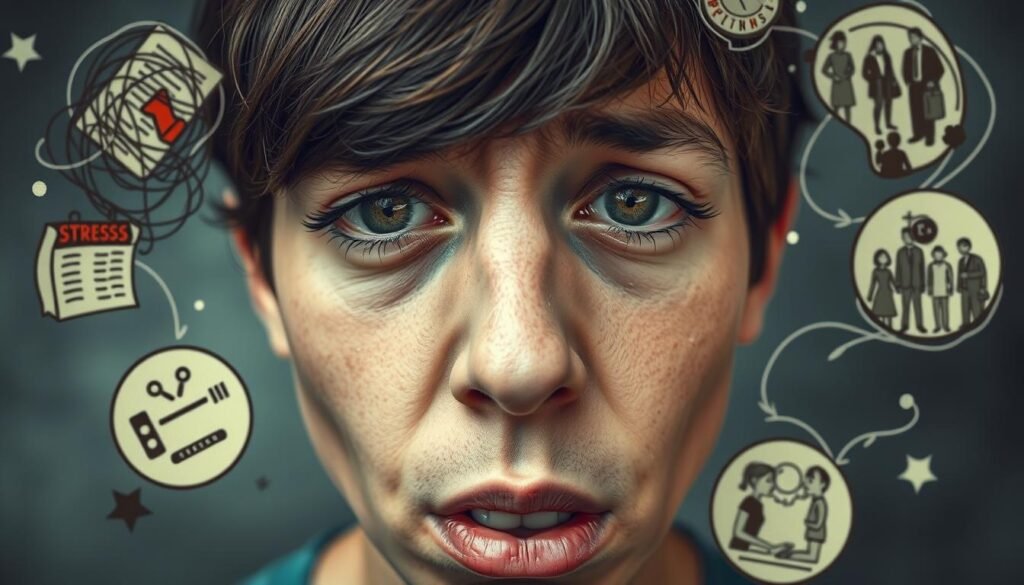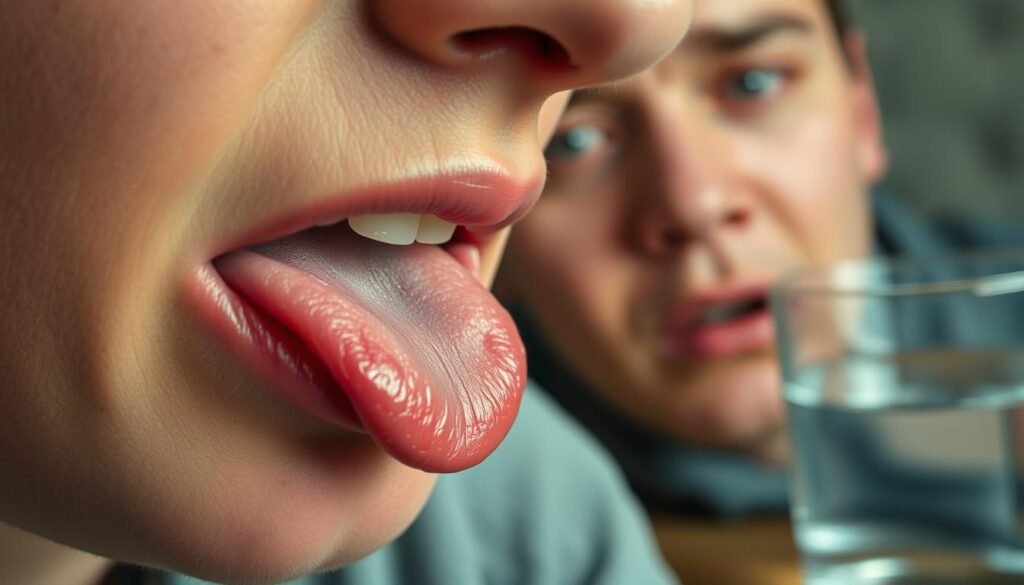About 70% of people in online therapy see big improvements in anxiety in just 8 weeks. This shows how managing anxiety well can really help. Along with other symptoms, anxiety can cause a dry mouth or xerostomia. It’s important to know how anxiety and dry mouth are connected. This helps in dealing with it effectively.
Anxiety affects us mentally and physically in many ways. The link between anxiety and dry mouth can come from things like mouth breathing, acid reflux, or medications. Knowing if your dry mouth is from anxiety or something else is key. We’ll look into how anxiety affects mouth moisture, ways to ease the symptom, and when to get help.
Key Takeaways
- Dry mouth is a common issue for those with anxiety.
- Factors like mouth breathing and certain medications impact anxiety-related dry mouth.
- Sticking with anxiety reduction techniques is vital for improvement.
- Tools like cognitive-behavioral therapy and self-help methods can manage symptoms.
- Getting the right treatment greatly helps with anxiety and dry mouth.
Understanding Anxiety and Its Symptoms
Anxiety is our body’s natural response to stress. It tells us when we might be in danger. But when these feelings last long and disturb our daily lives, they are more serious. They become what is known as an anxiety disorder. Knowing the signs of anxiety is key to managing it well.
What is Anxiety?
Anxiety is important for survival, triggering our fight or flight mode. This makes our heart beat faster and our breathing speed up. While useful in short bursts, constant anxiety is harmful. For some, it grows into bigger issues needing special care.
Common Symptoms of Anxiety Disorders
The symptoms of anxiety vary widely. On the mental side, you might feel:
- Excessive worry
- Fear and dread
- Irritability
Physically, your body might react by:
- Increasing the heart rate
- Speeding up breathing
- Causing a dry mouth
- Making you sweat more
Studies show dry mouth is more common among those with anxiety disorders. This symptom is far less common in people without these issues.
| Type of Symptom | Examples |
|---|---|
| Psychological | Worry, Fear, Irritability |
| Physical | Increased Heart Rate, Dry Mouth, Sweating |
These symptoms affect how a person functions every day. That’s why spotting and treating anxiety early is crucial.
Does Anxiety Cause Dry Mouth
Anxiety shows up in many physical ways, including dry mouth. This symptom can make daily things like eating and talking hard. Knowing how anxiety leads to dry mouth helps in dealing with it.
The Connection Between Anxiety and Physical Symptoms
The body reacts to anxiety with changes, mostly known as the fight or flight response. This can lessen saliva, making your mouth dry. Stress ups cortisol, which lowers saliva quality and amount.
This makes dry mouth worse, adding to stress and anxiety.
Research on Anxiety and Dry Mouth
Studies link anxiety disorders to dry mouth often. Many people with anxiety say they have this problem. Persistent anxiety might cause long-term dry mouth, due to how your nervous system and hormones change.
| Factors Affecting Dry Mouth | Influence on Saliva Production |
|---|---|
| Anxiety | Reduces saliva production |
| Cortisol Levels | Affects saliva composition |
| Dehydration | Directly decreases moisture levels |
| Medical Conditions | Can lead to dryness |
How Anxiety Triggers Dry Mouth
Anxiety affects our bodies in many ways, one of which is saliva production. This means when someone feels anxious, they might not make enough saliva. This can cause dry mouth, making it important to understand why this happens.
Mouth Breathing During Anxiety Episodes
When stressed or having a panic attack, people might breathe through their mouths. This skips the nasal passages that help keep our mouth wet. As a result, dry mouth becomes an issue. Research shows that people with anxiety report more dry mouth issues than those without. Mouth breathing doesn’t just cause dry mouth but can make you feel more thirsty when you’re stressed.
The Role of Hyperventilation
Hyperventilation is key in how anxiety causes dry mouth. Anxiety can make people breathe fast and shallow. This changes how we breathe normally and can make saliva production drop. Stress increases cortisol levels, which might further reduce saliva. Knowing this helps in finding ways to deal with dry mouth. Trying breathing exercises, drinking water, and relaxing with yoga or meditation can be useful. For tips on spotting physical anxiety signs, check out this link.

Additional Causes of Anxiety-Related Dry Mouth
Many things can make your mouth feel dry if you’re anxious. Knowing these can help find ways to deal with it. This knowledge can help you manage dry mouth that anxiety causes.
Impact of GERD on Saliva Production
GERD seriously affects how much saliva you make. People with anxiety might feel more stress and have more stomach acid. This problem can make your salivary glands work less well.
When you make less saliva, your mouth and throat get dry. This can make your anxiety feel worse when you’re stressed.
Medications That Cause Dry Mouth
Many medicines can make your mouth dry. This includes antidepressants, anxiety drugs like Xanax and Valium, antihistamines, and some pain relievers. It’s important to talk to doctors if you have this problem.
They can help you figure out if your medicine is causing dry mouth. You might be able to try different treatments or ways to feel better.

Identifying Symptoms of Dry Mouth
Knowing the signs of dry mouth is key, especially if you’re anxious. Spotting different symptoms helps figure out if you have dry mouth.
Typical Physical Manifestations
Common signs of dry mouth are:
- A sticky or dry feeling in the mouth
- Thick or stringy saliva
- Increased bad breath
- Difficulty chewing or swallowing
- Cracked lips and soreness
Keeping an eye on these symptoms helps understand your hydration and mouth health. Not paying attention may increase dental problems risk.
How to Self-Diagnose Dry Mouth
There are steps to self-diagnose dry mouth:
- Check how much you’re drinking during the day.
- Note any eating discomfort or related issues.
- Watch for more bad breath than usual.
- Look for dehydration signs, like cracked lips.
Talking about these signs with a doctor is important. It helps find out if anxiety or something else is causing dry mouth.

Home Remedies for Dry Mouth Due to Anxiety
Anxiety often leads to dry mouth, making daily tasks tough. Luckily, many home remedies can ease this issue and improve well-being.
Staying Hydrated
Keeping yourself hydrated is key in fighting dry mouth. Drink lots of water and choose sugar-free drinks to keep your mouth moist. Regularly drinking water boosts saliva, which is vital if you’re seeking natural relief from dry mouth caused by anxiety.
Try chewing sugar-free gum or sucking on ice cubes to aid saliva flow. Avoid caffeine and alcohol though, as they dry you out more and can make anxiety worse.
Natural Solutions to Alleviate Dryness
There are natural ways to manage dry mouth too. Placing a humidifier in your room can add needed moisture, especially beneficial during anxious times. Ginger and other herbs like marshmallow root and nopal cactus help too. They’ve been used to treat *natural relief for anxiety dry mouth* effectively.
These remedies can truly make a difference in comfort and dental health amid anxiety. For more tips, you can check out more about home remedies for dry mouth.
Tips for Managing Anxiety to Relieve Dry Mouth
Managing anxiety well can greatly lessen dry mouth symptoms. Stress reduction is key to lowering anxiety, which helps the body function better. This includes making more saliva. Adding activities like exercise, meditation, and deep breathing to your day can help a lot.
Stress Reduction Techniques
Those with anxiety can try different methods to ease their stress and physical symptoms. Working out can improve mood and lower stress. Doing calming activities like yoga or taking walks can make you feel more at peace and boost your emotional health.
- Engage in physical activities: Aim for at least 30 minutes of moderate exercise most days.
- Practice deep breathing: Incorporate focused breathing exercises into the daily routine.
- Try yoga or tai chi: Both practices encourage relaxation through movement and mindfulness.
Practicing Mindfulness and Meditation
Mindfulness teaches you to be more aware of your thoughts and what triggers your anxiety. Meditating regularly helps you relax, which reduces anxiety and symptoms like dry mouth. Taking time for mindfulness lets you control your feelings better.
- Start with guided meditation: Utilize apps or online resources for guidance.
- Incorporate daily mindfulness: Even a few minutes each day can enhance awareness and self-regulation.
- Create a peaceful environment: Designate a quiet space for mindful activities.
Using these strategies daily can make managing anxiety easier. This leads to better mental and physical health, including less dry mouth.
When to Seek Professional Help
It’s key to know when to get help for anxiety. If anxiety is strong or lasts a long time, help is needed. This helps manage severe anxiety that messes with daily life.
Identifying Severe Anxiety Symptoms
Different severe symptoms include feeling restless, easily upset, and hard time focusing. If these symptoms don’t get better, or if you always feel thirsty, it’s time to seek help. Around 6.8 million Americans have anxiety, but not all get treatment. Knowing symptoms is the first step to getting help.
The Role of Mental Health Professionals
Mental health experts are important for dealing with anxiety. They check your health, offer therapy, and manage medicine as needed. Therapy looks into deeper reasons for anxiety and symptoms like dry mouth. Getting help is crucial for a good treatment plan and better health.
If anxiety hurts your life, talk to a mental health expert. The aim is not just to handle anxiety but to deeply understand and overcome it. This approach leads to recovery and better health.
Learning about connections between anxiety and the body can help. It shows why it’s important to get the right advice and care.
Conclusion
The link between feeling anxious and getting a dry mouth is strong and complicated. Those with anxiety often find themselves with a dry mouth. This shows how anxiety and dry mouth are connected on a deep level.
For those struggling, changing your lifestyle and trying home remedies can help your dry mouth. Drinking more water, cutting back on caffeine, and trying yoga or meditation can make a big difference. Sometimes, though, these steps aren’t enough. That’s when it’s key to get help from a doctor.
Understanding the relationship between anxiety and dry mouth helps in tackling both issues. Regular talks with your doctor are vital. They keep you up to date on how to stay healthy and ease your symptoms of anxiety and dry mouth.